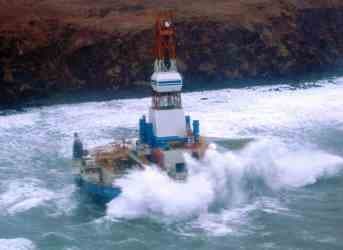Environmental advocacy groups expressing concern over frontier oil developments in the Alaskan arctic started the New Year on news that Shell's (NYSE:RDS.A) problems in the region continue. This week's grounding of the drill ship Kulluk was evidence that working in the harsh arctic environment was "a monumentally bad idea," said Greenpeace. The U.S.-based supermajor last year secured approval from the federal government to start a multibillion-dollar exploration campaign in the Chukchi and Beaufort Seas and much of the season was spent coping with weather and equipment issues. Though no oil is leaking from the stranded vessel, Shell's work in the harsh region has been beset by problems even the staunchest of oil hawks can't ignore.
U.S. Interior Secretary Ken Salazar stated during the summer that the Obama administration would hold Shell's "feet to the fire" on its plans for offshore Alaska. In August, the Interior Department said it was certain that some drilling would be safe, though Shell would need to ensure that its safety measures were in order before tapping into the arctic frontier. A 2009 study prepared for the company put the reserve estimate in the offshore arctic region at between 11.4 trillion to 305 trillion cubic feet of natural gas and between 2.8 billion and 65.8 billion barrels of oil. The company spent $4.5 billion on its exploration efforts in the region.
Related Article: Shell's Arctic Plans on Hold once more after Containment Dome Fails Tests
Advocacy group Oceana in August said Shell's investment in the arctic waters offshore Alaska wasn't worth the potential risks, however. Susan Murray, deputy vice president for the group, said it was fortunate that responders to the Kulluk grounding have been able to avert an environmental catastrophe, but stressed the Alaskan seas are unforgiving.
"Shell has not been able to conduct any phase of its operations without substantial problems," she said in a statement. "From construction of its response barge to complying with air and water protections to transit, Shell’s season has been plagued with problems and missteps, which culminated in this disaster."
Shell in late 2011 said it had on-site, near-shore and onshore oil spill response plans in place that are "second to none in the world." By August, however, the U.S. interior secretary said his department wasn't even sure if there would be an exploration campaign for Shell during the open drilling season. The company had scaled back its ambitions last year because of encroaching sea ice and several equipment issues brought renewed concerns about the safety of drilling in the harsh arctic climate. Testing of the Arctic Challenger spill dome, a device sanctioned by the U.S. Coast Guard, in the Puget Sound left the top half of the device "crushed like a beer can."
Related Article: US Companies Poised to Launch Chinese Shale Boom
U.S. Coast Guard Rear Adm. Thomas Ostebo briefed state lawmakers Wednesday on the response to the Kulluk incident. He said everyone involved in the response, from Shell to U.S. and state authorities, has the same objective in mind -- to recover the drill ship without any injuries or impact to the western shores of Alaska, where Kulluk struck ground. Given Shell's string of recent complications, however, Greenpeace said the U.S. supermajor has shown it's "utterly incapable" of operating safely in Alaska.
"Rather than opening up the high north to oil firms we need to keep this fragile place off-limits to reckless industrialization," the advocacy group stated.
ADVERTISEMENT
By. Daniel J. Graeber of Oilprice.com


















